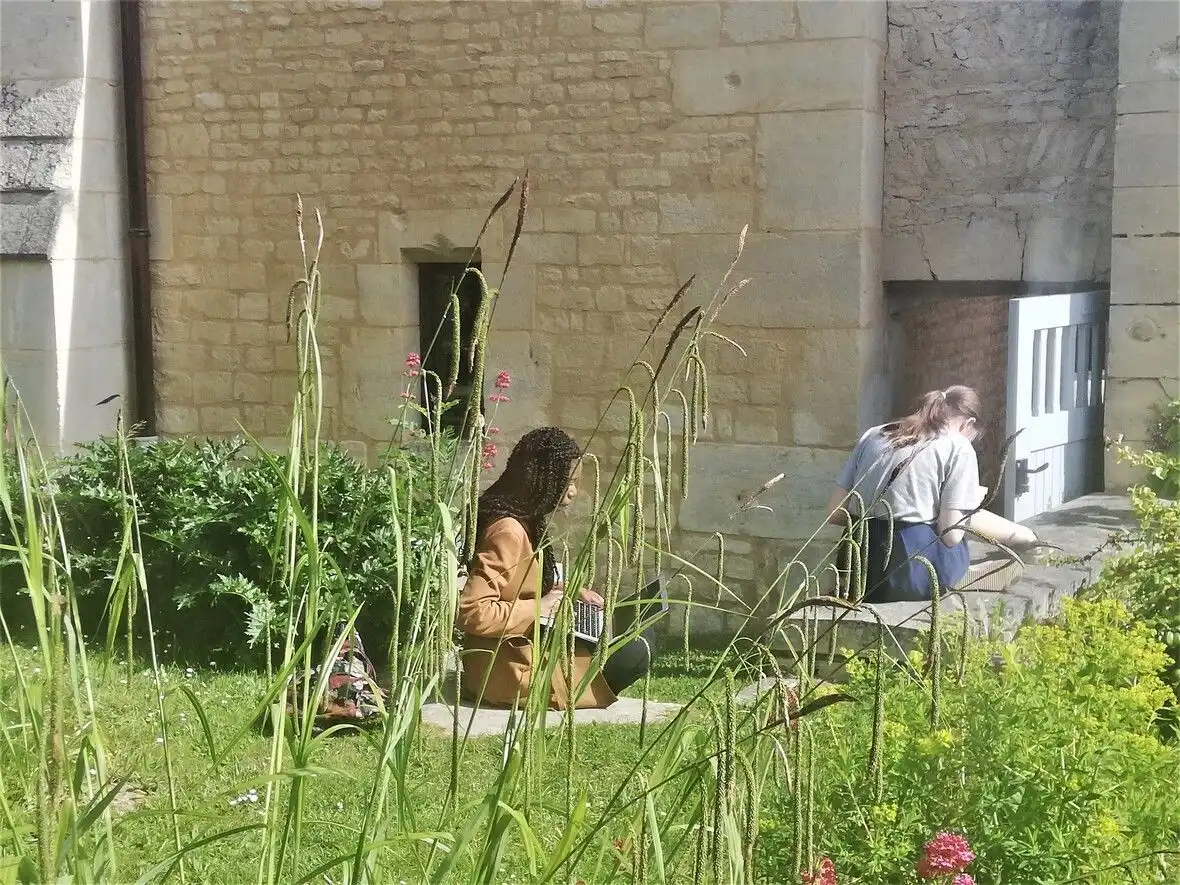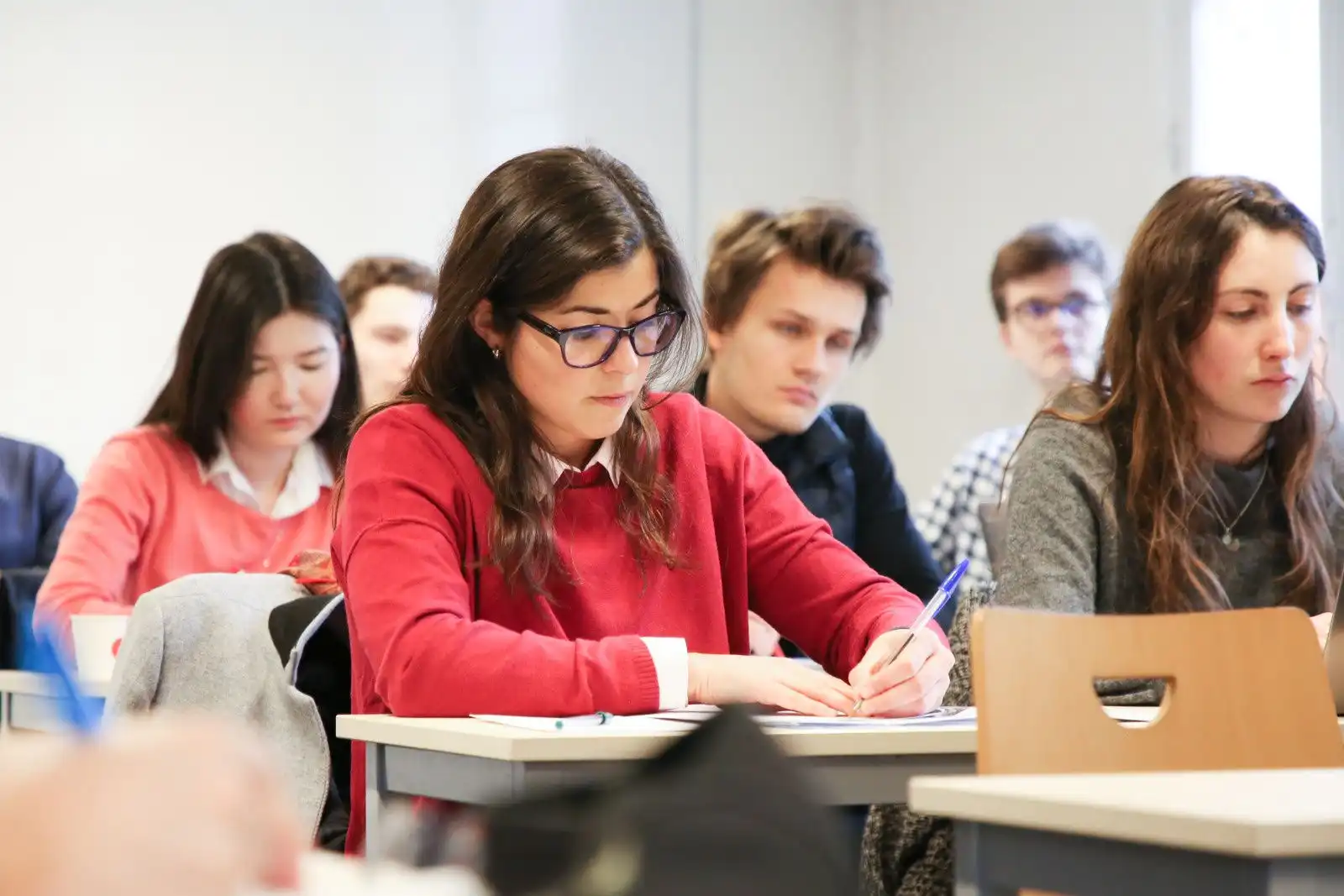
Home>Life at Sciences Po>Institute for Arts and Creation
Institute for the Arts and Creation
Created in 2023, the Institute for the Arts and Creation is a unique initiative with a dual objective:
- to integrate the arts into the curriculum, together with the humanities and social sciences, in order to develop skills in a diversified way ;
- to entrust artists with the opportunity to lead workshops or lectures, so that the Sciences Po community and the general public can benefit from their practice and vision.
We believe in the benefits of taking a multisensory approach to encourage boldness and think differently about the challenges facing contemporary society. We act by designing original workshops for students and inviting artists through three initiatives that complement the Chair of Creative Writing (created in 2019): the Chair of Cinema, the Chair of the Performing Arts and the Event Cycle “Through the artists’ eye”.
Watch the launching ceremony of the Institute (in French) with Claire Denis, film director, Jean de Loisy, exhibition curator, Mohamed Mbougar-Sarr, writer and Benjamin Millepied, dancer and choreographer
The Institute for the Arts and Creation aims to bring the arts and social sciences closer through:
- EDUCATION: by creating, studying and spreading educational methods that integrate the arts and the development of creative skills.
- RESEARCH: by stimulating exchanges between researchers and artists.
- CIVIC ENGAGEMENT: by sharing our events, experiments and educational resources with a large number of partners (in particular high schools, universities and nonprofit organizations).
Teaching through the arts
The Institute for the Arts and Creation follows a thread that begins with the admission interview (which includes the analysis of a visual work) and continues throughout the students’ experience at Sciences Po: learning through the arts.
The arts stimulate critical thinking, open-mindedness, tolerance to uncertainty and emotional skills. Thanks to the arts, students are able to practice and appreciate long term reflection and action, which allow them to escape from immediacy, take a step back and gain a wider perspective.
To support and encourage the benefits of learning through the arts, the Institute :
- offers 25 workshops a year in argumentation, public speaking and creative writing in French and English through its Writing and Rhetoric Centre (Find out more and register).
- develops an observatory of teaching practices by collecting and disseminating testimonials from teachers who use the arts to deepen the students’ reflection and transmit knowledge.
- provides training in teaching through the arts for teachers at Sciences Po and other partner establishments, such as high schools covered by our Equal Opportunity Programme (EOP).
The Institute also works in partnership with Sciences Po campuses, schools and Executive Education to enrich teaching through the arts.
Inviting artists
The Institute for the Arts and Creation runs a number of programs enabling artists to engage with students, teachers and researchers.
Chair of Creative Writing
The creation of the Chair of Creative Writing and the Writing and Rhetoric Centre in 2019 reinforces the importance of writing in teaching methods at Sciences Po. Every semester, a professional writer is invited to deliver two creative writing courses, lead masterclasses, and take part in public events organized by the Institute.
Watch the official handover from Yannick Haenel (spring 2024) to writer Jakuta Alikavazovic (the twelfth holder of the Chair of Creative Writing), in French:
Previous Chairs of Creative Writing:
- Fall 2024 : Jakuta Alikavazovic
- Spring 2024 : Yannick Haenel
- Fall 2023 : Karine Tuil
- Spring 2023 : Mohamed Mbougar Sarr
- Fall 2022 : Nathacha Appanah
- Spring 2022 : Mathias Énard
- Fall 2021 : Alice Zeniter
- Spring 2021 : Louis-Philippe Dalembert
- Fall 2020 : Maylis de Kerangal
- Spring 2020 : Patrick Chamoiseau
- Fall 2019 : Marie Darrieussecq
- Spring 2019 : Kamel Daoud
Chair of Cinema
Every year, a filmmaker is invited to host a series of public events and encourage reflection on cinema, creativity and the social sciences.
Previous Chairs of Cinema:
- Director Claire Denis was the first film director hosted by Sciences Po as Chair of Cinema in 2023 (see her inaugural masterclass, in French).
- Film director Mathieu Amalric succeded in 2024 (see his inaugural masterclass, in French).
Chair of Performing Arts
The Institute aims to cultivate a space for reflection through music and dance, and therefore created a Chair dedicated to these arts.
Previous Chairs of Performing Arts
- Dancer, choreographer and company director Benjamin Millepied - who has worked at the School of American Ballet, New York City Ballet, Morris Dance Center and Opéra national de Paris - was the first Chair of Performing Arts invited by Sciences Po. See his masterclass “Space and Creation” with Sciences Po's School of Management and Impact (in French).
- Singer-actress Natalie Dessay succeeded in 2024, leading the Sciences Po community along the paths of free creation, from opera to musical comedy to theater.
Visual arts conference series – “Through The Artists’ Eye”
The Institute offers a cycle of four major talks every year, giving leading figures from the art world the opportunity to engage with the Sciences Po community and the general public.
Each year, a common theme connects these conferences hosted by Jean de Loisy - known for his major exhibitions and his radio show on France Culture, as well as for having led important institutions including the Palais de Tokyo and the Beaux-Arts de Paris.
- In 2023, leading artists Tino Sehgal, Edith Dekyndt, Tomàs Saraceno, and Kapwani Kiwanga were invited to discuss “The Relationship Crisis” with philosopher Frédéric Gros, Professor of Political Humanities.
- In 2024, “The Universal in Humanity” brought together artists SMITH and Gaëlle Choisne.
Research
The Institute for the Arts and Creation works hand in hand with Sciences Po’s researchers to bridge the gap between social sciences and the arts. To quote few of many examples, it collaborated with
- The International Research Centre, to invite artists to participate in colloquia for an interdisciplinary dialogue on approaches and ideas. For instance, conductor and composer Laurent Couson and opera singer Fabienne Conrad exchanged views with academics and practitioners at a conference entitled “Peace: conceptional terrains – experiences and methods” organized by Frédéric Ramel on October 13 and 14, 2023. At the heart of these discussions was the question of artistic creation and representations of peace.
- With Sciences Po’s History Center. On May 30 and 31, 2024, Frédérique Leichter-Flack and Patricia Lopez-Gay organized “Witnessing through Literature and the Arts”, an interdisciplinary and scientific encounter on the subject of historic testimonials in literature and the arts. This event provided an opportunity to speak with Franco-Rwandan author Beata Umubyeyi Mairesse about the intersection between history, witnessing, and memory in genocide studies. She had already participated in a lecture series entitled “Literature and Social Sciences in Africa” along with writers Sami Tchak, Hemley Boum, and Johary Ravaloson, another event organized in partnership with the Institute.
- Sciences Po’s history department and law school, in their exploration of how archives are represented through the project “Jouer l’archive” (“Acting the Archive”), which brought to life an archive of December 1940. Theatrical performances, followed by discussions with the artists, were accessible to the Sciences Po community.
Outside Sciences Po
The Institute for the Arts and Creation pursues its mission outside Sciences Po by
- Organizing workshops in secondary schools covered by the Equal Opportunity Programme (EOP) to connect students with artists and expand visual literacy.
- Conducting social impact projects linked to the arts, such as writing and reading workshops in hospitals for nursing staff, patients and their families.
- Deepening international academic partnerships, to share and spread good practices.
Partners
The Institute for the Arts and Creation operates with the support of essential partners, including:
- Chanel and le19M
- The Fondation Simone and Cino Del Duca, Karen and Michel Reybier and Céline Fribourg, partners and sponsors of the Writing and Rhetoric Centre and the Chair of Creative Writing
- The Fondation Jean-François et Marie-Laure de Clermont-Tonnerre, partner of the conference series “Through the artists’ eye”
- The Fondation Gérard B. Lambert, partner of the “Nature in the city” project in partnership with Urban School.
Writing residency: an immersive experience

From Monday, 16 May to Friday 20 May, 2022, the CWR offered an original pedagogical project, thanks to the support of the Fondation Simone et Cino Del Duca, in the form of a week-long writing residence at the Institute for Contemporary Publishing Archives (Institut mémoires de l’édition contemporaine, or IMEC) at the Ardenne Abbey.
Writing and Rhetoric Centre

Sciences Po’s Writing and Rhetoric Centre help students develop and enrich their written and oral expression in order to improve their skills in public speaking.